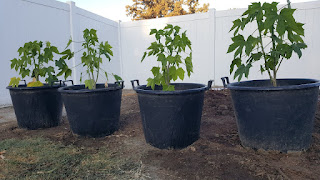I had to purchase these cuttings.
- Chaya is a leafy fast growing perennial shrubs. It's a hardy plant and grow to about 10-20ft. Tall.
- Chaya propagation is commonly done by cutting. The milky sap healed and sealed the wound if kept dry a few days prior to planting.
- Here in USDA Zone 9a winter temperatures is as lowas 25°F. It's frost sensitive. Once established it can be winterizing by heavily mulching it to protect the roots. It'll be killed by hard freeze but usually re-sprouts from the roots.
- Extremely pest resistant.
- Chaya bears white flowers, both, male and female.
- Chaya has high levels of protein, calcium and iron. Leaves contained carotene, potassium, vitamin A, B,C, and folic acid.
- Chaya contains hydrodynamic glycosides, a toxic compound easily rendered by cooking.
- Requires a quick blanched of 1-5 minutes or more before eaten.
- DO NOT use aluminum cookware when cooking Chaya, it can result in a toxic broth that cause diarrhea.
FRIENDLY NOTE:
- It was said that in the Yucatan peninsula of Mexico folks have eaten it raw. If it's true, it's possible that they've become immune to it for being exposed to since birth.
- Do to its toxic compound and if this veggie is foreign to you, I highly encourage all to moderately and gradually introduce it to your digestive system.
- To my understanding, humans, plants, and animals alike... all needs nutrients to grow and function. And Chaya like any other plants, absorb these needed raw minerals and process it into a form that is safe for human consumption. Therefore, it needs a good source and an access to calcium, iron, and nitrogen fertilizer in order to produce a high concentration of nutrients in its leaves. We gardeners must provide them with these needed organic minerals. And we must replenish these minerals into the soil because after years of crops growing these minerals will be depleted.
 |
| Cnidoscolus Estrella |
 |
| CHAYA, Cnidoscolus picuda |
 |
Chaya, Cnidoscolus plegada
|












Comments
Post a Comment